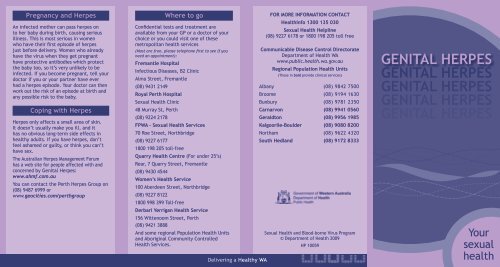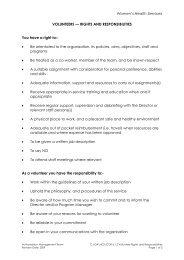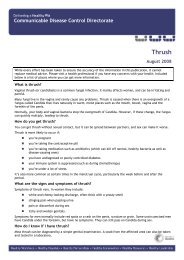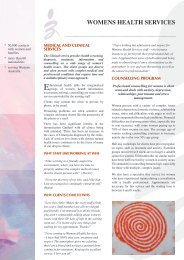Genital Herpes - WOMENS HEALTH & FAMILY SERVICE
Genital Herpes - WOMENS HEALTH & FAMILY SERVICE
Genital Herpes - WOMENS HEALTH & FAMILY SERVICE
Create successful ePaper yourself
Turn your PDF publications into a flip-book with our unique Google optimized e-Paper software.
Pregnancy and <strong>Herpes</strong><br />
An infected mother can pass herpes on<br />
to her baby during birth, causing serious<br />
illness. This is most serious in women<br />
who have their first episode of herpes<br />
just before delivery. Women who already<br />
have the virus when they get pregnant<br />
have protective antibodies which protect<br />
the baby too, so it’s very unlikely to be<br />
infected. If you become pregnant, tell your<br />
doctor if you or your partner have ever<br />
had a herpes episode. Your doctor can then<br />
work out the risk of an episode at birth and<br />
any possible risk to the baby.<br />
Coping with <strong>Herpes</strong><br />
<strong>Herpes</strong> only affects a small area of skin.<br />
It doesn’t usually make you ill, and it<br />
has no obvious long-term side effects in<br />
healthy adults. If you have herpes, don’t<br />
feel ashamed or guilty, or think you can’t<br />
have sex.<br />
The Australian <strong>Herpes</strong> Management Forum<br />
has a web site for people affected with and<br />
concerned by <strong>Genital</strong> <strong>Herpes</strong>:<br />
www.ahmf.com.au<br />
You can contact the Perth <strong>Herpes</strong> Group on<br />
(08) 9487 6999 or<br />
www.geocities.com/perthgroup<br />
Where to go<br />
Confidential tests and treatment are<br />
available from your GP or a doctor of your<br />
choice or you could visit one of these<br />
metropolitan health services<br />
(Most are free, please telephone first to see if you<br />
need an appointment):<br />
Fremantle Hospital<br />
Infectious Diseases, B2 Clinic<br />
Alma Street, Fremantle<br />
(08) 9431 2149<br />
Royal Perth Hospital<br />
Sexual Health Clinic<br />
48 Murray St, Perth<br />
(08) 9224 2178<br />
FPWA – Sexual Health Services<br />
70 Roe Street, Northbridge<br />
(08) 9227 6177<br />
1800 198 205 toll-free<br />
Quarry Health Centre (For under 25’s)<br />
Rear, 7 Quarry Street, Fremantle<br />
(08) 9430 4544<br />
Women’s Health Service<br />
100 Aberdeen Street, Northbridge<br />
(08) 9227 8122<br />
1800 998 399 Toll-free<br />
Derbarl Yerrigan Health Service<br />
156 Wittenoom Street, Perth<br />
(08) 9421 3888<br />
And some regional Population Health Units<br />
and Aboriginal Community Controlled<br />
Health Services.<br />
Delivering a Healthy WA<br />
FOR MORE INFORMATION CONTACT<br />
HealthInfo 1300 135 030<br />
Sexual Health Helpline<br />
(08) 9227 6178 or 1800 198 205 toll free<br />
Communicable Disease Control Directorate<br />
Department of Health WA<br />
www.public.health.wa.gov.au<br />
Regional Population Health Units<br />
(Those in bold provide clinical services)<br />
Albany (08) 9842 7500<br />
Broome (08) 9194 1630<br />
Bunbury (08) 9781 2350<br />
Carnarvon (08) 9941 0560<br />
Geraldton (08) 9956 1985<br />
Kalgoorlie-Boulder (08) 9080 8200<br />
Northam (08) 9622 4320<br />
South Hedland (08) 9172 8333<br />
Sexual Health and Blood-borne Virus Program<br />
© Department of Health 2009<br />
HP 10059<br />
GENITAL HERPES<br />
GENITAL HERPES<br />
GENITAL HERPES<br />
GENITAL HERPES<br />
GENITAL HERPES<br />
Your<br />
sexual<br />
health<br />
<strong>Genital</strong><strong>Herpes</strong>_8ppDL2009Final.indd <strong>Herpes</strong>.indd 1<br />
1<br />
PMS 529 PMS 5265<br />
3/04/200912:31:18 2:36:17 PM PM
What are <strong>Genital</strong> <strong>Herpes</strong><br />
<strong>Genital</strong> herpes are blisters or sores on the<br />
genitals. They are caused by either <strong>Herpes</strong><br />
Simplex Virus (HSV) Type I or Type II. HSV<br />
Type I is more common on the mouth<br />
(cold sores) and HSV Type II on the genitals.<br />
Both viruses can infect the mouth and the<br />
genital area.<br />
How is it spread<br />
<strong>Herpes</strong> are spread by skin-to-skin contact<br />
with someone who has the virus, including<br />
contact with infected skin during sex. Cold<br />
sores on the mouth can spread the virus to<br />
the genitals during oral sex.<br />
There is no cure for herpes. Once you<br />
have the virus, it stays in the nerves of the<br />
infected area of skin. It can be dormant<br />
(‘sleeping’) for some time and then flare up,<br />
sometimes causing an ‘episode’ of sores.<br />
<strong>Herpes</strong> are most easily passed on when you<br />
can see blisters or sores. But it can be passed<br />
on even when there aren’t any sores; this is<br />
most common in the first 2 years of infection.<br />
Signs and symptoms<br />
When a person is first infected, they may not<br />
get sores.<br />
Many people with genital herpes don’t know<br />
because they have no symptoms.<br />
The first herpes episode is usually the worst.<br />
You may feel generally unwell as if you are<br />
getting the flu, then small blisters appear.<br />
They burst and become sores. Later,<br />
scabs form, and finally the skin heals after<br />
1 or 2 weeks.<br />
In females, blisters may appear around the<br />
vagina, the urethra, the cervix, or between<br />
the vagina and the anus.<br />
In males, blisters may appear on the penis<br />
and foreskin, and sometimes inside the<br />
urethra, on the scrotum or in the area<br />
between the penis and the anus.<br />
It can be very painful to pass urine if it runs<br />
over the sores.<br />
Rarely, herpes can appear on the buttocks,<br />
lower back and other areas below the waist,<br />
as well as the hands, breasts, back, fingers<br />
– anywhere that has touched an infected area.<br />
Many cases of genital herpes don’t show up<br />
as blisters. They can appear as a small area<br />
of rash, cracked skin, or some other skin<br />
condition on the genitals.<br />
Although herpes sores heal, the virus stays in<br />
the body, and you can have more outbreaks.<br />
These are called recurrent episodes.<br />
Recurrent episodes<br />
Recurrent episodes usually occur on the same<br />
part of the body as the first attack, but are<br />
often shorter and milder. Recurrent episodes<br />
are less likely with HSV Type I infection.<br />
Usually they happen less often and are<br />
milder over time, and can just stop.<br />
Some infected people never get more than<br />
1 episode. Some people can have herpes<br />
but never have symptoms.<br />
<strong>Herpes</strong> episodes are more likely to happen<br />
when your immune system is weak. Illness,<br />
tiredness, stress, periods or sexual activity<br />
can trigger them, but they can occur for no<br />
obvious reason.<br />
Checking it out<br />
If you think you may have genital herpes,<br />
go see your doctor who will take a sample<br />
from an infected area with a swab and<br />
send it to a laboratory. It’s best if the sore<br />
or blister is less than 4 days old. You may<br />
need a blood test as well to see which<br />
type of HSV you have.<br />
Treatment<br />
During an episode of genital herpes these<br />
things may help:<br />
• Paracetamol or aspirin can reduce pain<br />
and soreness.<br />
• Betadine paint will dry out the blisters and<br />
help stop the sores from getting infected.<br />
• Bathing sores with salt water (2 teaspoons<br />
of salt per litre, or 1 cup of salt in a bath)<br />
can help them heal.<br />
• Applying an anaesthetic jelly or cream<br />
can reduce the pain, particularly when<br />
passing urine.<br />
• If it hurts to urinate, you can also try<br />
passing urine while sitting in a warm bath.<br />
Your doctor may prescribe anti-viral<br />
drugs. These ease the pain and severity of<br />
episodes, especially if you take them within<br />
2 days of any sign of blisters.<br />
If you have lots of outbreaks you need to<br />
take medicine all the time. Anti-viral drugs<br />
can’t cure you or stop you passing herpes<br />
on to another person. However, they can<br />
reduce the symptoms, and lower the risk<br />
of infecting another person when you don’t<br />
have any symptoms.<br />
Protecting yourself and<br />
your partner<br />
<strong>Herpes</strong> is passed on to another person by<br />
skin-to-skin contact from an infected area.<br />
<strong>Herpes</strong> is most infectious from the first<br />
signs of sores developing (tingling of the<br />
skin, numbness or shooting pains) until the<br />
scabs have gone. To protect yourself and<br />
your partner, avoid sex when there are any<br />
signs of sores on the genitals. Don’t have<br />
oral sex when there is any sign of a cold<br />
sore on the mouth.<br />
You can pass on herpes to someone even<br />
when you have no visible blisters or sores.<br />
This is most likely when you’ve just caught<br />
the virus.<br />
You can’t catch herpes or pass it on to<br />
another person unless you have skin-to-skin<br />
contact with the infected area.<br />
Condoms with water based lubricant or<br />
dental dams will reduce the risk, but<br />
they only protect the area of skin<br />
covered by the condom or dental dam.<br />
They do protect you against other sexually<br />
transmitted infections (STIs).<br />
Talking about herpes or any STI can be<br />
difficult, but any person you have sex with<br />
has a right to know if you have herpes.<br />
Discuss it when you are feeling relaxed<br />
and confident, and not just before you<br />
have sex. Your partner will appreciate your<br />
honesty and that you don’t want to infect<br />
him/her. You also have the right to know if<br />
they are infected too.<br />
There is no vaccination for genital herpes.<br />
<strong>Genital</strong><strong>Herpes</strong>_8ppDL2009Final.indd <strong>Herpes</strong>.indd 2<br />
2<br />
PMS 529 PMS 5265<br />
3/04/200912:31:18 2:36:17 PM PM









